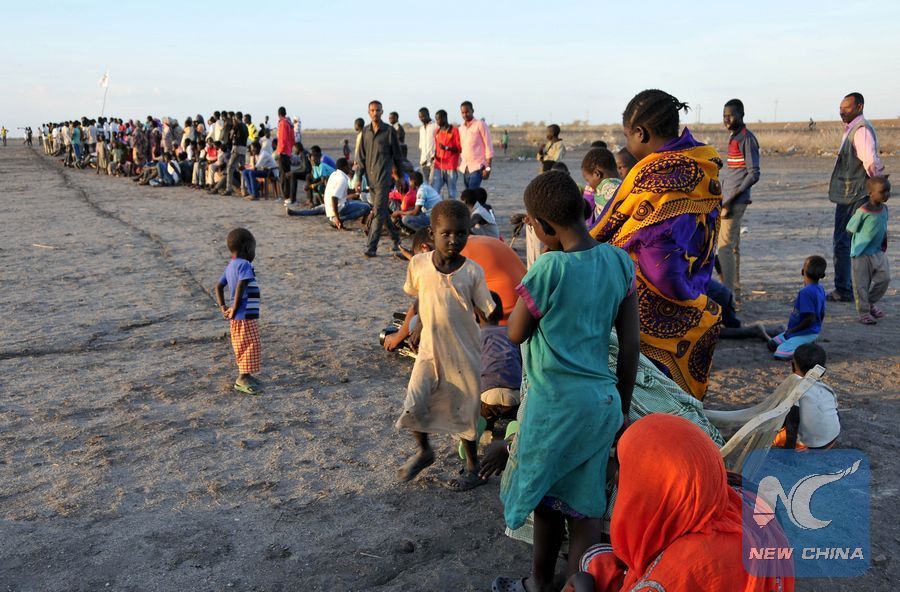
Refugees from South Sudan wait for relief materials at a refugee camp in Sudan's White Nile state near the border with South Sudan on May 17, 2017. The Sudanese Red Crescent Society (SRCS) on Tuesday said it is about to launch an urgent relief appeal to meet the growing influx of refugees from South Sudan. (Xinhua/Mohamed Babiker) (zw)
by Ronald Ssekandi
KAMPALA, June 24 (Xinhua) -- African leaders meeting on Friday at the just concluded international refugee summit have said bad governance is responsible for the refugee influx that parts of the continent are facing.
Ugandan President Yoweri Museveni who convened the meeting dubbed Solidarity Summit said bad governance by those in leadership and a lack of a credible opposition are partly to blame for the conflicts on the continent that forced people to flee to other countries.
The summit was convened together with the UN to raise funds to address the refugee crisis that Uganda is facing.
Uganda is now Africa's leading refugee-hosting country, having jumped from the eighth largest refugee-hosting country in the world in mid-2016 to the third largest today, after Turkey and Pakistan.
UN figures show that the country hosts more than 1.2 million refugees from neighboring South Sudan, Democratic Republic of the Congo (DRC), Burundi, and Rwanda among others. Of these, more than 900,000 are from South Sudan.
Museveni said all this could be avoided if politicians both in leadership and in opposition desist from sectarian tendencies.
"Bad politics, utilizing the pseudo-ideology of opportunistically exploiting identity of religion or tribes is behind most of these crises. The ideology of sectarianism in Africa must be condemned," Museveni told the meeting.
"The leaders, both in government and opposition, of the suffering countries have a very serious historic responsibility to end this hemorrhage and suffering of the poor African people affected," he said.
Zambian leader Edgar Lungu said there is need for Africa to invest in peace, noting that the suffering of people must end.
REGIONAL HOTSPOTS
Somali President Mohamed Abdullahi Mohamed said his country is on the move towards creating peace. Since 2007, African Union peace keeping troops have been deployed to help stabilize the country.
Museveni said regional organizations and the UN are supposed to help end the crises on the continent citing the endless fighting in eastern DRC.
"The ICGLR and the UN have been totally unuseful on this longstanding tragedy in that area," Museveni said. ICGLR is the International Conference on the Great Lakes Region, a regional body charged to ensure among others peace in the region.
Several efforts by ICGLR and the UN to wipe out the fighting over the years have not yet yielded results. UN has a peacekeeping mission in the DRC, one of the countries that generates thousands of refugees to her neighbors.
The Ugandan president also urged the Burundi government to respect commitments made by the East African Community to bring an end to the fighting in the country.
In South Sudan, fighting is still going on inclined on tribal lines. Millions of South Sudanese have fled to neighboring countries, with Uganda hosting majority of them.
Over 900,000 South Sudanese refugees are in Uganda after fighting broke out in December 2013 between troops loyal to President Salva Kiir and his then deputy Riek Machar.
The UN Secretary General Antonio Guterres who also attended the refugee summit said everything must be done to end the conflict in South Sudan and praised Uganda for accepting many South Sudanese refugees.
Museveni briefed the meeting that President Kiir has mandated him to deal with certain aspects of the South Sudanese crisis.
Museveni recently has been meeting both South Sudanese government officials and rebels with the aim of ending the fighting.

